New Tanzania RCP Projects Heed Impact of Poverty on Mental Health
The Reaching Children’s Potential Program (RCP) in Tanzania introduced mental wellness as a key component of holistic child and family health in 2018. Working together, Ukwega Ward community leaders, RCP staff and short-term volunteers have built an educational foundation for behavioral and physical wellbeing practices. Two new Global Volunteers projects aim to further address the sensitive interrelationship between poverty, cultural norms, family cohesion and mental health in partner villages.
One of the greatest challenges of comprehensive development in low-income countries is the pervasive burden of poverty on every aspect of people’s lives. Generational financial instability exacerbates social isolation and loneliness, diminishes motivation and self-care, and can quickly lead to serious mental and physical disorders such as major depression, substance abuse, violence, heart disease, pregnancy difficulties, gastrointestinal illness, suicidal ideation, and untimely death. These conditions were quantified in a community-wide mental health assessment of the Ukwega Ward in 2024, leading to Global Volunteers’ immediate response with depression and alcohol abuse education and interventions.
Two additional projects launched in 2025 address the consequences of untreated emotional and behavioral disorders. Widespread gender-based violence (GBV) and extreme vulnerability among teen and adult mothers is deeply rooted in chronic stress, trauma and despair, and require careful and immediate responses. Our collaboration with the Kilolo District Social Welfare Office, Iringa Region mental health professionals, and the University of Iringa ensures that volunteers and RCP staff follow social, cultural and government protocols in meeting these critical needs.
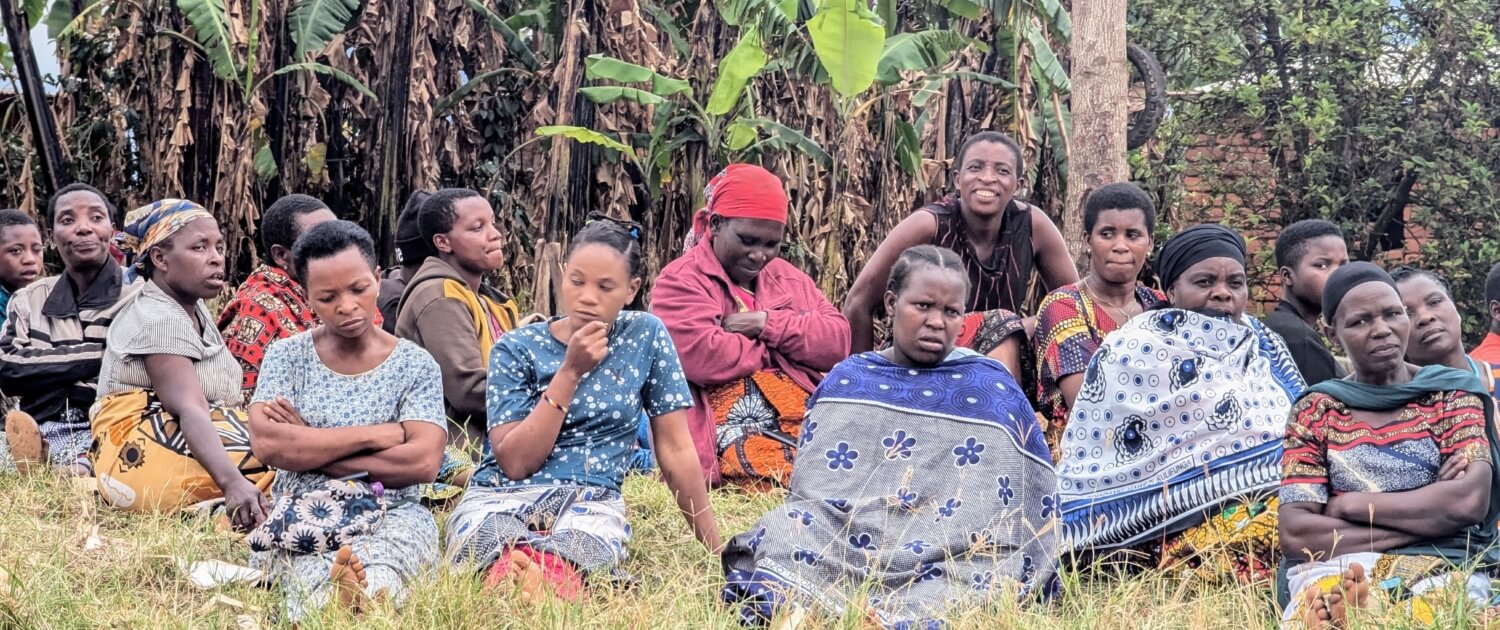
Addressing Gender-Based Violence at the Village Level
According to the Tanzania Demographic and Health Survey (TDHS), nearly 40% of urban and rural Tanzanian females aged 15-49 have experienced physical violence, and over 10% have suffered sexual violence. A higher-than-average GBV rate affects girls and women of the same age range in the Iringa Region. In the Ukwega Ward’s villages, women estimate that at least half of girls and women live with physical, mental and emotional abuse. Most occurs at the hands of intimate partners, reflecting a crisis of power dynamics within households and communities. Extreme socioeconomic and cultural factors in this area are blamed for these circumstances.
Tanzania’s National Plan of Action to End Violence Against Women and Children (2017-2022) outlines comprehensive strategies to end GBV, with directives to Regional and District offices. But, in practice, local law enforcement is stymied by limited funding and personnel. Further, social stigma often discourages survivors from reporting assaults. Added to that are patriarchal beliefs condoning or trivializing violence. Therefore, the National Plan can be undermined in village settings by disparate social norms protecting the status quo.
GBV undermines women’s mental and physical health, dignity, security, parenting ability, and frequently leads to sexual consequences such as unwanted pregnancies and sexually transmitted infections. Women’s economic dependence on their abusers often prevents them from leaving their sexually, emotionally and physically violent relationships.
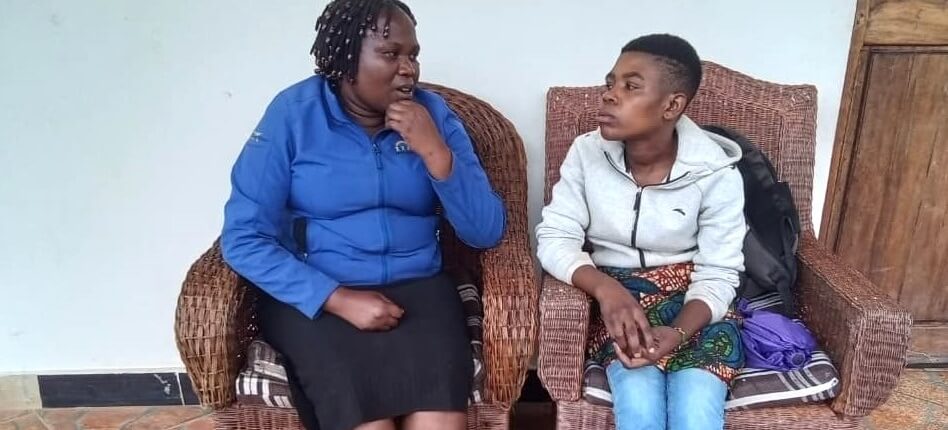
Senior RCP Caregiver and Mental Wellness Education Manager Regina Mhagama (left) counseled a vulnerable RCP mother in 2024.
Global Volunteers targets the root causes of GBV – poverty, inequality, mental trauma, and hopelessness – through education, resource allocation, and collaboration with all community members, to foster a culture of respect and safety for everyone. Specialists refer victims to health, social welfare, and judicial services, including psychological counseling and family therapy services; emergency medical treatment; and resolution with law enforcement and legal representation. RCP Caregivers and GBV interns work together with village leaders, pastors, educators and elders to identify cases of GBV and persuade victims to report abuse. Engaging men and boys in this effort is essential, so RCP Fathers’ Goodwill Groups receive instruction on family planning and pregnancy, child development, and supportive shared parenting, and rejecting violence by stabilizing family life through clear and affirming communication, conflict resolution and equality in roles and responsibilities.
Short-term volunteers with professional expertise or lived experience in domestic violence, law enforcement, social work, marriage and family therapy, anger management, and related disciplines can work alongside community leaders, RCP staff and local mental health professionals through workshops, village meetings, home visits, school presentations, and educational events on GBV-prevention goals.

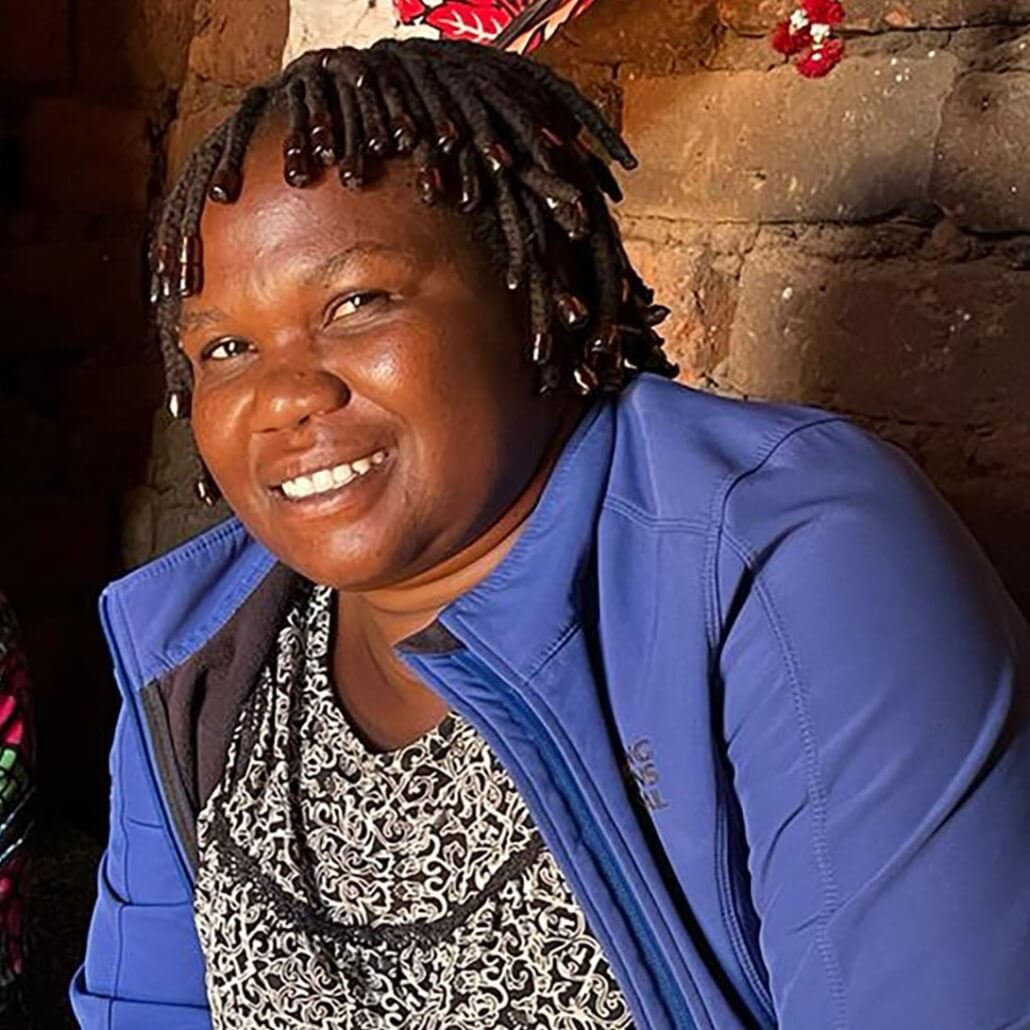
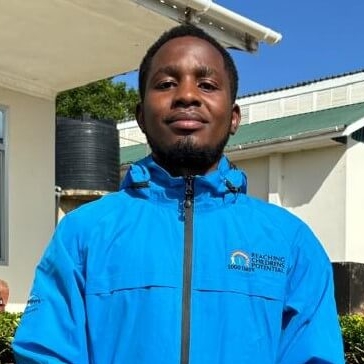
GBV Interns Happy Sanga, Chacha Wangoge and RCP Mental Wellness Education Manager Regina Mhagama work closely together with RCP Caregivers to assess family heath needs in the GBV Awareness and Intervention Project.
Enabling Vulnerable Mothers to Thrive
Poverty exacts its most destructive impacts on indigent children and women. Young, single mothers without family or economic support are a destitute minority in the Ukwega Ward, and without interventions, they struggle greatly to fully employ the benefits of the RCP Program. Consequently, their children are more susceptible to poor health, under-nutrition, accidents and physical stunting. We currently extend supplemental services to 25 to 30 impoverished mothers ages 17 to 40 who are socially isolated, psychologically distressed, vulnerable to exploitation and in need of special help.
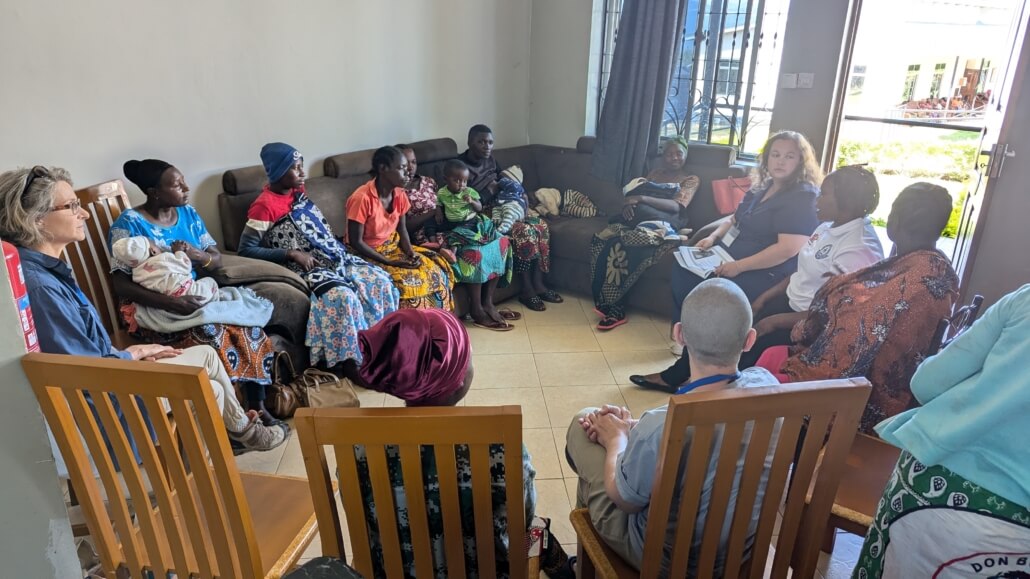
Mental wellness volunteers support and mentor RCP mothers and children one-on-one and in small groups; sharing personal experience with stress reduction, alcohol abuse, depression, gender-based violence and related conditions.
We work to build a sustained network of community support to monitor and intensively care for compromised mothers and children, so they can achieve self-sufficiency. RCP staff, village leaders and volunteers collaborate on customized education and mentorship plans for each family in the areas of physical and mental health, economic resilience, and access to local and regional support resources. By understanding each mother’s vulnerabilities, we can work together to improve mothers’ security, standard of living, and personal confidence in raising their children.
The project employs a four-part strategy for sustained and replicable services: Skills Building and Training, Sustainable Economic Projects, Self-Empowerment Unions, and Emotional and Mental Support. The moms have requested volunteers’ help with workshops and counseling on recovering self-esteem, reducing stress, resolving conflict, developing life skills, asserting their rights, generating income, and expanding self-understanding. At the same time, RCP Caregivers work with mothers together and individually on enhanced parenting skills and self-care, while medical staff monitor the mothers’ and children’s mental and physical health. Future capacity building includes training in marketable skills in areas like sewing, handicrafts, animal and fish farming, growing high-demand crops, and hair dressing; mentoring for finishing primary and/or secondary school; establishing peer support groups for sharing experiences and solutions; and establishing a role for serving in community decision-making.
Short-term volunteers with professional expertise or lived experience working with impoverished populations, HIV/AIDs, developing life skills, work skills and self esteem, addiction, homelessness and domestic abuse can work alongside RCP caregivers and local mental health professionals to mentor mothers and deliver essential services.
Providing continuous service for addressing poverty-related mental health issues requires a holistic approach combining economic support, community resources, and volunteer services year-round. We work aggressively to develop a multi-level response to vulnerable mothers’ needs, and to design fundraising strategies to support this effort. “Through skill-building, sustainable projects and proper guidance, poor mothers can break the cycle of dependency, and not only achieve financial independence but also gain purpose, confidence and resilience,” says Regina Mhagama.
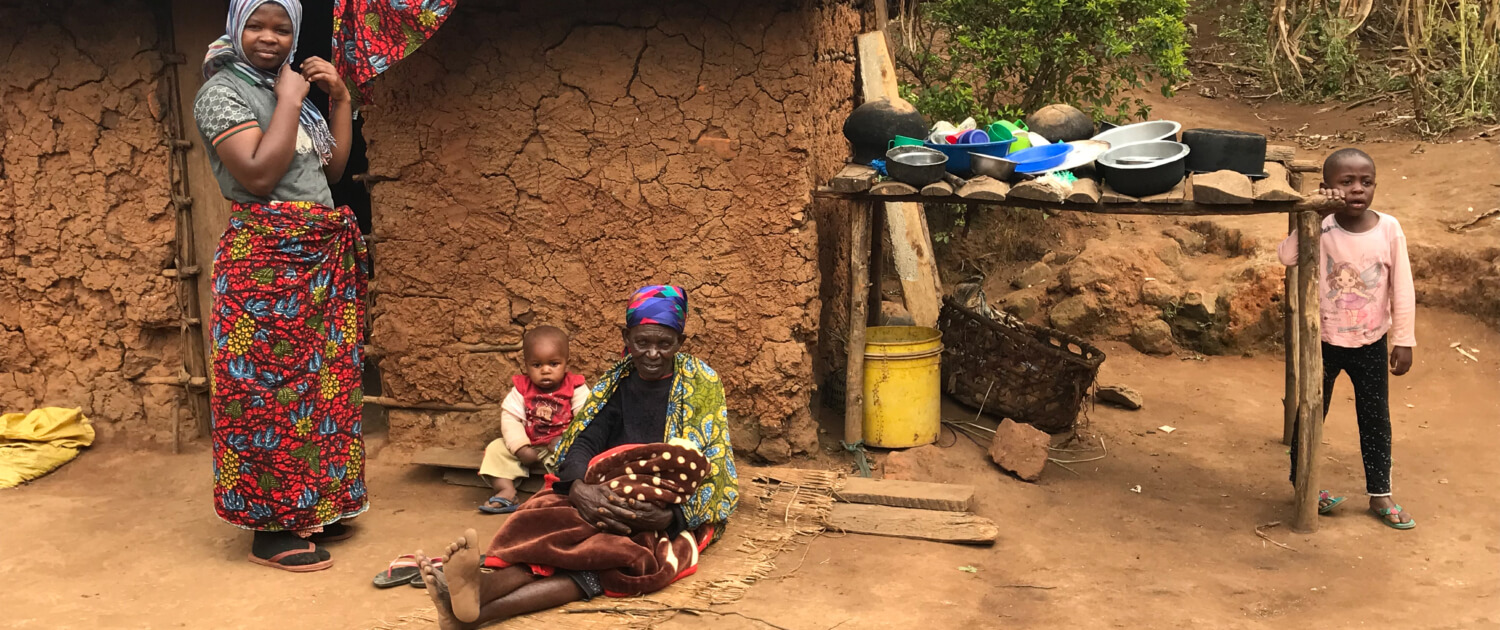
For both new programs, we strive to significantly increase the number of individuals seeking and receiving assistance, and to provide premier and uniquely staffed models for village-based program throughout the Iringa Region. Long-term, we are working toward three sustained capacities:
- Collaborative GBV prevention strategies through sustained outreach; staff and community leader training; integrated school curricula; regional media broadcasts; cooperation with law enforcement; and district presentations and informational events.
- Access to psychological health, social welfare, and judicial services, including individual counseling and family therapy services; immediate medical treatement; resolution with law enforcement and legal representation; transportation to police services and gender desks; victims’ temporary, safe accommodations; emergency childcare services.
- Community-based entrepreneurship opportunities, which will require staff training in market identification and sustainability, product and services development, time management, financial resilience, innovation, and self-reliance.
Read More About the Tanzania Mental Wellness Initiative:

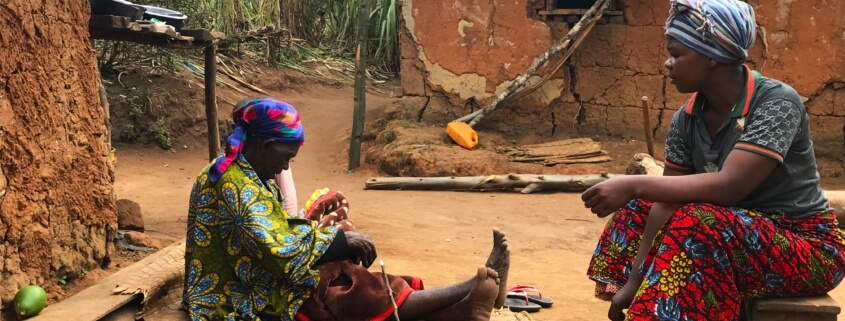


Leave a Reply
Want to join the discussion?Feel free to contribute!